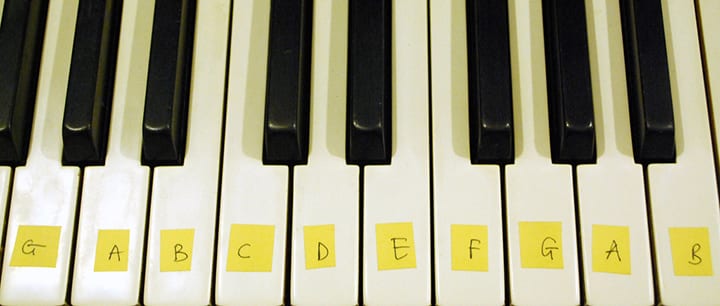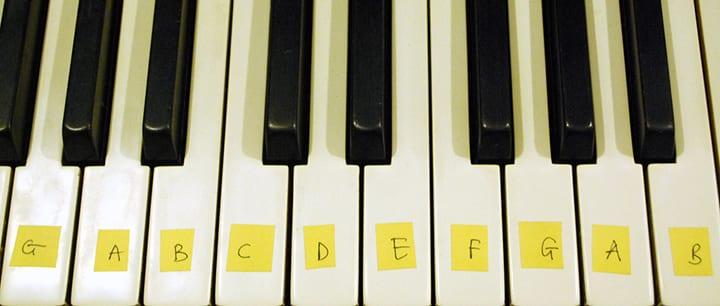 Not progressing as fast as you’d like on the piano? Here, Covington, KY teacher Stacey S. shares three common mistakes that might be tripping you up as you’re learning piano…
Not progressing as fast as you’d like on the piano? Here, Covington, KY teacher Stacey S. shares three common mistakes that might be tripping you up as you’re learning piano…
Learning piano is a fun yet challenging journey. If you’re feeling frustrated, however, you might be tempted to quit before you can really can play much of anything. But by addressing three small mistakes often made, you can improve your learning process!
Small Mistake: Not practicing enough
Big Impact: Slow progression in learning, weak technique, and possible boredom
Practicing is critical at all stages of learning piano. Consistent practice is especially important in the beginning, even when early music in method books may seem too simple and can sometimes be a bit boring. The early, easy, repetitive songs are primarily for building finger strength and music-reading abilities. They are not meant to sound great but rather should be approached as exercises.
Some students, especially teenagers and adult beginners, will be able to read the notes quicker than they can move their fingers independently. Repetitive and consistent practice improves finger strength and dexterity. For younger students and/or older students with the “playing-by-ear” ability, actual playing comes easy yet note reading is challenging. Consistent early practice of connecting the written notes to the played outcome drastically improves reading ability.
Without frequent home practice, only marginal gains will be made in lessons from week to week. With slow progress you may become frustrated and bored with the piano. Even if it is challenging at first, regular practice leads to quicker progression through learning materials and keeps piano fun and exciting.
Solution: 10-15 minutes of practice 5-6 days a week from the beginning of piano study for all students! Make sitting down at the piano a daily habit. Early on in piano studies, just making it to the piano most days should be the main goal, with the amount of time spent practicing gradually increasing.
Small Mistake: Skipping the theory book
Big Impact: You’ll only play by finger numbers, with no true understanding of how music works
Why is a written workbook so important if the goal is to learn to play music? Music theory is the study of how music works, the structure, and the language of music. Increased understanding of how music works leads to freedom from a teacher, and no one plans to take lessons the rest of their life. Music knowledge learned through piano lessons can then also be applied as you sing in a choir, play a new instrument in your school band, join your church’s handbell choir, teach yourself guitar, etc. Through learning to read, write, and speak this new musical language, many more musical opportunities will be made available the rest of your life.
Solution: Work with a piano teacher to find a theory book correct for your age and level. Make theory work just as important as playing.
Small Mistake: Not having a good teacher/student relationship
Big Impact: You may feel like quitting, or you might associate negative emotions with music
Often new students study with whoever is closest, most convenient, and/or cheapest. Sometimes this works, but often students will lose interest if they don’t connect on some sort of personal level with the teacher. They might associate piano lessons as something to be dreaded, awkward, or uncomfortable.
Soultion: Instead, take time when selecting a teacher for yourself or your child, and switch teachers if something doesn’t feel quite right. Look for a teacher who you connect with and provides motivation to work harder through loving guidance and support. Often students are afraid to switch teachers for fear of hurting our feelings; we are professionals and would much rather have you study with someone who works well for you and under whom you will thrive. Takelessons offers many options when “shopping” for a teacher and provides great support in getting to know the teacher. Read reviews, listen to recordings/videos of the teacher, and ultimately, trust your instincts after the first few lessons.
Through diligent practice, music theory study, and a great student/teacher relationship, every student of piano can excel regardless of natural talent or abilities. Implement the solutions suggested above and your piano playing skills will grow exponentially.
 Stacey S. teaches piano, music theory, and music performance in Covington, KY. She received her Bachelor of Music in Vocal Performance from DePauw University, as well as Master of Music in Vocal Performance from University of Cincinnati, College-Conservatory of Music. Stacey has taught students of all ages since 2005. Learn more about Stacey here!
Stacey S. teaches piano, music theory, and music performance in Covington, KY. She received her Bachelor of Music in Vocal Performance from DePauw University, as well as Master of Music in Vocal Performance from University of Cincinnati, College-Conservatory of Music. Stacey has taught students of all ages since 2005. Learn more about Stacey here!
Photo by ms.akr
Suzy S.

